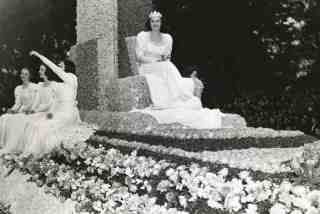Tennis Legend Helen Wills Moody Dies
- Share via
Helen Wills Moody, an eight-time Wimbledon champion whose name is evocative of tennis’ elegant golden age, has died in Carmel. She was 92.
In failing health in recent years, Moody died Thursday at Carmel Convalescent Hospital.
Her on-court stoicism, which earned her the nickname “Little Miss Poker Face,” gave Moody a tactical advantage during a time when the game had a more genteel atmosphere. Her strong will, combined with enormously powerful strokes, helped Moody compile a winning record that few have matched.
She won 31 major titles. In addition to Wimbledon, Moody won the U.S. Championship seven times and the French Championship four times. She amassed a 158-match winning streak, and from 1927 to 1932 did not lose so much as a set in singles.
“Helen sure showed me a lot,” said Jack Kramer, a former Wimbledon champion who lost to Moody in mixed doubles at the Pacific Southwest Championship held at the Los Angeles Tennis Center in 1940. “She had a hell of a forehand, a powerful shot. She couldn’t serve for aces, but she mixed it up. She never missed.”
While playing on the small, clubby tennis circuit, Moody gained a reputation for aloofness and, after her retirement from tennis, for her reclusive nature. But Kramer remembered a small act of kindness from Moody in 1941. The two had agreed to play mixed doubles in an exhibition, but, at the last minute, Moody was unable to appear.
“Not long after, I got the nicest letter in the mail,” he said. “She apologized for not playing and made some very kind remarks. I never forgot that.”
The daughter of a surgeon, Moody was raised in Centerville in Alameda County and grew up in high society. She never took a tennis lesson, learning the game by watching tennis players at the Berkeley Tennis Club.
Her powerful shots--particularly her forehand--were said to be a product of playing mainly against men at the club. Her serious demeanor and the starched white sailor suit and white visor that she customarily wore became Moody’s trademarks.
Former Wimbledon champion Ted Schroeder, who was Moody’s partner in that 1940 mixed doubles match against Kramer, remembered her as a player who was impeccably turned out as well as deadly skillful.
“Never a hair out of place, the skirt extending precisely,” Schroeder said Thursday from his home in La Jolla. “She showed no emotion whatsoever. She never said a word. I don’t think we ever spoke. But if you don’t think she wanted to win, you’re wrong. What a competitor. I don’t think I ever played a better tennis match than I did that day with Helen, and that ought to tell you something.”
Moody’s austere public face left her wanting in comparisons to her biggest rivals of her era--Helen Jacobs, the gregarious Californian, and the glamorous French player Suzanne Lenglen.
Lenglen was a sensation, and reveled in shocking the starched tennis establishment with the leaping flair of her play and her tempestuous outbursts. Moody’s upbringing and temperament forbade any emotional display other than a formal post-match handshake.
The two met only once, in 1926, at Cannes, France. The match pitted two stars at opposite ends of their careers--Lenglen, the deft and reckless shotmaker who would soon turn professional, against the implacable 20-year-old whose game plan was simply to hit hard then harder. Lenglen was the winner.
Moody’s admirers included many in the Los Angeles acting community of the ‘30s and ‘40s, for whom tennis was a backyard pastime. When Charlie Chaplin was asked to name the most beautiful thing he had ever seen, he responded: “The movement of Helen Wills playing tennis.”
Don Budge, who in 1938 won tennis’ Grand Slam--the Australian, French and U.S. championships and Wimbledon--said he used to ride his bicycle to Berkeley to watch Moody practice.
“She was one of my idols,” he told Associated Press. “She was one of the greatest players of all time.”
Moody began playing tennis at 14 and a year later won the girls’ national title. In 1923, at 17, she won the U.S. women’s singles championship, becoming the youngest champion at that time.
She won the Olympic gold medal in Paris in 1924, the last time tennis was a medal sport before it returned at the 1988 Games in Seoul. She was named Associated Press’ female athlete of the year in 1935 and inducted into the International Tennis Hall of Fame in 1959.
Moody divorced her first husband, Frederick Moody, in 1937 and two years later married Irish polo player Aiden Roark, one of the best players of his generation. In recent years she was known as Helen Wills Moody Roark.
She returned to the Bay Area after her retirement from tennis and continued to closely follow the game. Her low profile and reluctance to leave home caused tennis great Alice Marble to call her “the Greta Garbo of tennis.”
Moody was the author of three books, including her autobiography, “15-30: The Story of a Tennis Player,” published in 1937. In the 1920s she wrote a tennis instruction book and a mystery, “Death Serves an Ace.”
Last year she donated all of her trophies and tennis memorabilia to UC Berkeley, her alma mater.
There are no known survivors. Her ashes will be scattered at sea, and there will be no service.
More to Read
Go beyond the scoreboard
Get the latest on L.A.'s teams in the daily Sports Report newsletter.
You may occasionally receive promotional content from the Los Angeles Times.











